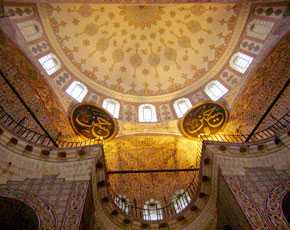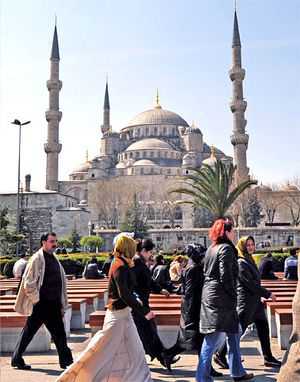Turkey’s latest attempt to acquire nuclear power resulted in humiliating failure on September 24, when only one consortium submitted a bid to build the country’s first nuclear power plant at Akkuyu, near the eastern Mediterranean port of Mersin.
In the six months following the announcement of the contract in March, 13 consortia bought tender documents. However, almost all had subsequently expressed reservations about the project; not least about the terms of the state guarantee to buy electricity for the first 15 years of the proposed plant’s operating life. Their concerns were exacerbated by the recent turbulence on the international markets and increased uncertainty about the prospect of securing financing for the project. In the run-up to the September 24 deadline for bids, there were repeated calls for an extension of the deadline pending a resolution of ambiguities in the tender terms and a decline in the turbulence on international financial markets (see EDM, September 23). The ruling Justice and Development Party (AKP), however, remained adamant that the process would continue as scheduled.
“Turkey has already waited until very late for nuclear energy. It doesn’t have the luxury of being able to afford a postponement,” Prime Minister Recep Tayyip Erdogan declared on September 22 (Anadolu Ajansi, September 22).
As a result of the AKP’s intransigence, all but one of the potential bidders declined to make an offer. Humiliatingly for the government, the opening of the bids at 14.30 on September 24 was carried live on national television. Although officials from the tender commission reported that they had received six responses, it soon became clear from the five slim envelopes and single large parcel sitting on the desk in front of them that they had received only one bid. The five slim envelopes contained letters thanking the commission for its time and politely declining to submit an offer. The sole bidder was a joint venture between the state-owned Atomstroyexport of Russia and the Turkish Ciner Group (NTV, CNNTurk, CNBC, September 24).
What happens now remains unclear. In theory, the tender process consists of three stages. In the first, the consortium presents the commission with a sealed envelope indicating an intention to bid. In the second stage, the technical details of the bid are forwarded in a sealed envelope to the Turkish Atomic Energy Authority (TAEK) to be examined for compliance with the project’s safety standards. If TAEK approves the project, a sealed envelope containing the proposed price of the electricity is opened (Referans, Dunya, Anadolu Ajansi, September 25).
The AKP appears to have assumed that despite all the expressions of concern, several consortia would present bids and the government would be able to choose the cheapest. When asked by a Turkish journalist whether the single bid meant that the tender would now be cancelled, Haci Duran Gokkaya, the general manager of the state-owned Turkish Electricity Trading and Contracting Inc. (TETAS), huffily replied: “The fact that there was a bid means that the competition process is continuing” (NTV, Anadolu Ajansi, September 24). Gokkaya did not specify the identity of the rival with whom the Atomstroyexport-led consortium is now competing.
The Turkish media is in doubt about why, alone of all the consortia that bought tender documents, it was the one led by a Russian state-owned monopoly that submitted a bid. Turkey currently obtains almost two thirds of its natural gas and approximately one third of its oil from Russia (see EDM, September 9).
“The reason Russia was interested in the project was because it is the largest supplier of natural gas to Turkey, which gives it extraordinary bargaining power,” noted columnist Metin Munir in the daily Milliyet. “One of the main reasons the other companies kept their distance was concern about payment for the electricity that they would produce. Russia has no such worries. It is confident that all it would have to do would be to give the government a kick in the backside by cutting off the gas for a couple of days in the middle of winter” (Milliyet, September 25).
Although it has received less coverage in the Turkish media, a decision by the AKP to award the contract to Atomstroyexport would undoubtedly also have political repercussions. Even before the tension sparked by the war between Russia and Georgia in August, the United States would have been unlikely to welcome Turkey’s choosing the same company that has been so heavily involved in Iran’s nuclear program. In the current political climate, awarding the contract to build Turkey’s first nuclear power plant to a Russian company would doubtless be regarded in Washington as not just an economic but also a strategic decision.
Despite Gokkaya’s comments, the general consensus in Turkey is that the AKP will eventually have to cancel the nuclear power tender. It is currently unclear whether it would simply invite private companies to submit bids in a new tender or whether it would look for some kind of public-private partnership. Although the Nuclear Power Plant Law, which was promulgated in November 2007 (Law No. 5710, published in the Official Gazette, November 21, 2007), provides for the state to build the plant on its own if necessary, the Turkish public sector lacks the expertise to do so.
Whichever option the AKP decides to take, the result is likely to be a further loss of time and credibility, both of which are already in increasingly short supply. Turkey currently has a total installed electricity production capacity of 40,834 megawatts (MW) (www.tetas.gov.tr); but 13,393 MW is from hydroelectric plants, which can operate only at a limited capacity as the result of declining rainfall. A recent study by the state-owned Turkish Electricity Transmission Company (TEIAS) forecast that, even if the nuclear plant at Akkuyu is completed, Turkey will still face severe electricity shortages over the next decade. The TEIAS study was based on worst case and best case scenarios, taking into account the expected growth in electricity demand over the period from 2008 to 2017. According to the best case scenario, Turkey will add 12,917 MW in installed capacity by 2017. Under the worst case scenario, just 8,599 MW will be added; but the study also found that in order to keep pace with expected demand, the country will need a minimum of 22,000 MW in extra capacity by 2017; and if the economy continues to grow at a reasonable rate, it is more likely to need an additional 34,155 MW.
“Whatever we do, we face a crisis,” noted Songul Selvi in a commentary on the report in the daily Dunya. “The only question is how bad.” (Dunya, September 25).






